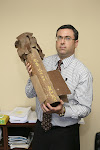Arutz Sheva visited the Chen Ha’Tzafon synagogue in Petach Tikvah on Wednesday, where Jewish music singers Yitzchak Meir and Shlomo Abramson led the congregations in the special prayers for Yom Ha’atzmaut, Israel’s Independence Day.
The service, written by Israel's Chief Rabbinate at the formation of the state of Israel, is recited in religious Zionist synagogues all over Israel. It is a spiritual way to make the difficult transition from Memorial Day to Independence Day more meaningful.
The morning service will include the Hallel (Praise to G-d) prayer recited on holidays, but the traditional Ma'ariv (evening) Service on the eve of the holiday marks the transition. It begins with the congregation chanting several chapters of thanksgiving from the Book of Psalms and singing verses from the Lecha Dodi ("Come my beloved") prayer.
Ma'ariv, a short service, is next, but it concludes with a stirring addition to the service, added for Independence Day:
The ark is opened to show the Torah scrolls, the cantor proclaims "Hear O Israel, the Lord Our G-d, the Lord is One" and the congregation repeats it after him. He then says the words of Elijah the Prophet on Mount Carmel, said also at the end of Yom Kippur: "G-d is our Lord" - three times - and the congregation repeats this after him.
The shofar is sounded and the congregation breaks into song with the words of King David "When G-d returns the exile of Zion, we will be as in a dream" sung to the tune of Israel's national anthem "Hatikvah".
The uplifting impact of the service is the transition from mourning for those who paid the ultimate price to thanking G-d for the everpresent miracle of the Jewish state, and on to the joy at being part of this miracle. And so, the congregtation goes on to sing "Next year in Jerusalem" and most begin a joyous dance around the synagogue to these words, hearts filled with gratefulness to G-d for coming home after 2000 years of exile.
“In general, coming in to this day you’re really on an emotional roller coaster,” Abramson told Arutz Sheva. “That’s part of the whole transition going on in the streets. You see it going on and it’s unbelievable. Everyone’s so emotionally charged."
He added, “You see everyone at the cemeteries, visiting all the people that made this country, the people that made it possible for us to live here, and then you come into this unbelievable prayer, and everyone’s dancing. That’s really part of the Jewish people, going from the lowest to the highest.”
Israelis celebrate Independence Day with parties, barbecues, fireworks and live performances. Not all, of course, begin the festivities with prayer in the synagogue.
However, Abramson said he believes the prayer is indeed the most important part of the celebration.
“[The prayer] is what really brings us into the day,” he said. “Tomorrow we’ll do the barbecues and get together with friends but now it’s really just thanking G-d. That’s the main part of every holiday: we’re thanking G-d for everything, and this is the most personal for everyone. During other holidays we connect through the Torah, but Independence Day is something special which just recently happened, 60 years ago, and everyone here is really connected to it personally in one way or another. Starting it with a prayer is the highest. That’s where you feel really connected to the people and you want to connect everything to G-d.”

